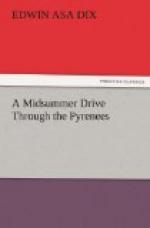Murray and Madame the Widow had each spoken dishearteningly of Bareges. With their verdict concurred also the few other accounts we had heard of it. Murray stigmatizes it as “cheerless and forbidding,” “a perfect hospital,” and remarks that “nothing but the hope of recovering health would render it endurable beyond an hour or two.” Another marks it curtly as “a desolate village tucked into the mountain side, with avalanches above and torrents below; in summer the refuge of cripples; in winter the residence of bears.” No one at Luz was found to say a good word for Bareges, except as to the undoubted cures its waters effect; and on the whole the outlook summed itself up as very far from promising.
In view of this abuse we have been predisposing our minds to extenuate the shortcomings of the place and to extol rather than dispraise it. One does not like to maltreat even a resort when it is down. But as we draw up the hill and see the black surroundings and enter the frowsy, dismal street, the desire to extol vanishes and even the possibility of extenuating becomes doubtful. The carriage pauses, while two of us who have hurried ahead examine the two hotels reputed best; each is equally uninspiring, and the one we finally choose we thereupon immediately regret choosing and regretfully choose the other. Meanwhile the carriage is being circummured by an increasing hedge of idlers and invalids, staring with great and open-minded interest at the arrival of visitors who seemed actually healthy and were coming here uncompelled; and the visitors themselves are glad to vanish from the public wonder into the stone passageway of the hotel.
Within is a large, cobble-paved court around which the hotel is built, and out upon the upstairs veranda overlooking this we are led and assigned to rooms. The rooms are clean, but unadorned and bare, and so seems the hotel throughout. It is not the lack of adornment, however, that dispirits us; Madame Baudot’s at Eaux Chaudes was unadorned likewise, and yet was an ideal of inviting comfort. Here, there seems to be something more,—an inexplicable taint of depression over the hotel, which strangely affects us. We struggle hysterically against it, trying to laugh it off, speculating vainly over the dreary, disconsolate weight which each has felt from the moment of entering the village; and at length conclude to investigate the mystery by a survey out-of-doors.




